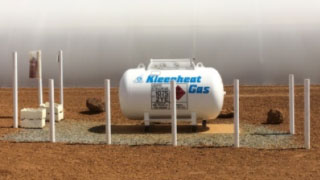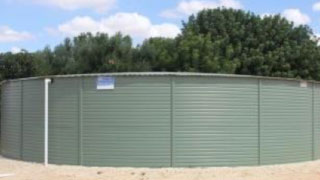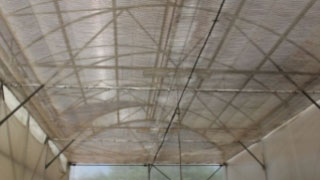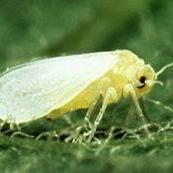Environmental strategy
Our aims
Our aim is to reduce the reliance on pesticide use in agricultural crops in Australia. We offer alternative ways of controlling insect pests and mites in horticultural crops, utilising Integrated Pest Management (IPM). IPM combines all pest control methods including biological, cultural, mechanical, physical and chemical controls. This helps growers produce better yields and quality with reduced use of pesticides - a more sustainable way of growing their crop. These techniques have reduced impacts on the surrounding environment and to society as a whole.
We operate two insectaries based in Loxton and Muchea to produce our range of biological control agents. Our operations at these insectaries have varying impacts on the environment and we have identified these to monitor, reduce and control these impacts. Our main environmental impacts are Energy, Water, Transport, Building, and Waste.
Our aims are to:
- Be a leader in the field of IPM within Australia.
- Increase environmental awareness among staff and clients.
- Operate our facilities as efficiently as possible to reduce impacts on the environment.
Energy and carbon
 This is the area where we probably have the largest impact on the environment. Insectary laboratories need power 24 hours a day and 7 days a week. Rearing rooms and greenhouses need to be maintained at optimum temperatures using a variety of climate control mechanisms which all utilise electricity. We reduce our impact on the grid by implementing a few practical tasks or innovative technology. These include:
This is the area where we probably have the largest impact on the environment. Insectary laboratories need power 24 hours a day and 7 days a week. Rearing rooms and greenhouses need to be maintained at optimum temperatures using a variety of climate control mechanisms which all utilise electricity. We reduce our impact on the grid by implementing a few practical tasks or innovative technology. These include:
- We generate our own energy from solar panels.
- We use LPG gas in the greenhouses for heating; a cleaner fuel source than oil, diesel or wood.
- All greenhouses and insect rearing rooms have thermostats to regulate temperature. Manitenance of optimum temperatures helps reduce power and gas for temperature regulation.
- Conserving power by switching off appliances and lights when not in use at night and over weekends.
- Insulation (see buildings and greenhouses)
There are still improvements that can be made to minimise our energy use and we continue to explore these avenues.
Water
 Water is a valuable resource and is utilised on a daily basis at the insectaries, everything from irrigation to cleaning up. We realise the value of this resource and use it wisely by having various systems and procedures in place. These include:
Water is a valuable resource and is utilised on a daily basis at the insectaries, everything from irrigation to cleaning up. We realise the value of this resource and use it wisely by having various systems and procedures in place. These include:
- Recycling water used for irrigation therefore saving on water and fertiliser inputs.
- We have rainwater tanks which we use for irrigation, drinking and cleaning.
- We save water by using precise drip irrigation.
- We utilise computer software to regulate irrigation needs based on solar triggers throughout the day.
All these methods aid in reducing our water usage however we are looking into ways to further reduce our usage.
Waste
Recycle and reuse are the keywords here for us. Not only does it reduce our impact on the environment by reducing what goes to landfill, it is more cost effective for us too. Here are a few small things we do to reduce our waste.
- We reuse paper within the office and insectary for growing media and packaging.
- We use recycled cardboard for packaging
- We reuse growing media after we have cleaned it, or supply to the general public for mulching their gardens.
- We wash and reuse rearing containers, therefore reducing waste products.
- We recycle waste products such as cardboard, paper, aluminium drink cans and plastic bottles.
Transport
- Our consultants travel long distances around Australia by car and air travel. With careful planning of trips we are able to visit multiple growers at the same time reducing the travel back and forth and the carbon emissions that go along with it.
- We have a network of consultants stationed in high use areas to service clients locally wherever possible.
Buildings and greenhouses

- All buildings and sheds are insulated allowing us to maintain optimum temperatures with minimal energy use.
- Rearing rooms are insulated to maintain optimum temperatures more effectively and thermostats are used to regulate temperature.
- The greenhouses are double walled which better regulates the temperatures, and thermal screens reduce suns rays on hot days and supply a ceiling at night. These techniques reduce the input costs of heating and cooling.
While we have done what we can to improve older structures we also realise that should future structures be built we will look into options that are as energy efficient as possible to further reduce our impact on the environment.
Culture
To run our insectaries as efficiently as possible we have to create an awareness and knowledge amongst our staff of the values, initiatives and commitment to reduce our impacts on the environment. This is done by:
- Involving staff in the implementation of this policy. They are actively encouraged to reuse, recycle and conserve inputs.
- Staff are aware of our values and initiatives regarding environmental impacts and we welcome their ideas on how to further this policy.
- Where possible we use local businesses and labour which helps support the community.
- We endeavour to provide advice to our clients regarding their environmental impacts.
Creating a good culture and awareness among staff and clients alike will enable us to move forward in a positive manner and therefore encourage our "lead by example" approach.
In the field
Our biggest impact is to help growers reduce the use of pesticides on horticultural crops around Australia. We tailor IPM programs for each growers requirements and where possible monitor their crops and provide ongoing advice. Introducing beneficial insects and maintaining a balance of beneficials and pests reduces the need for regular broad spectrum pesticides. Where pesticides are required we recommend products that are specific to the pest requiring control and if possible products that do not harm the beneficial organisms. The benefits of this approach are:
- Less chemicals used by growers, safer for their health.
- Less residues on the food for the public.
- Lower off-target environmental contamination.
- Decreased chances of chemical resistance. This preserves the chemical effectiveness for when it is really necessary.
- Regular spraying of pesticides can affect plant health. Any plant crops that are only sprayed sporadically are generally healthier, live longer and produce higher yields. This has benefits of better production per unit area making better use of other inputs such as water and fertiliser.
- Spraying less frequently conserves fuel, labour and chemical inputs.
Monitoring
We realise that there is always room for improvement and encourage staff, management, and growers alike to come forward with new ideas that can be implemented. Whether they are great or small every little bit counts in reducing our overall impact on the environment. We will endeavour to constantly monitor and seek ways to improve our efforts and ensure that targets are met.
- We continually review this policy and related business issues at our management meetings.




